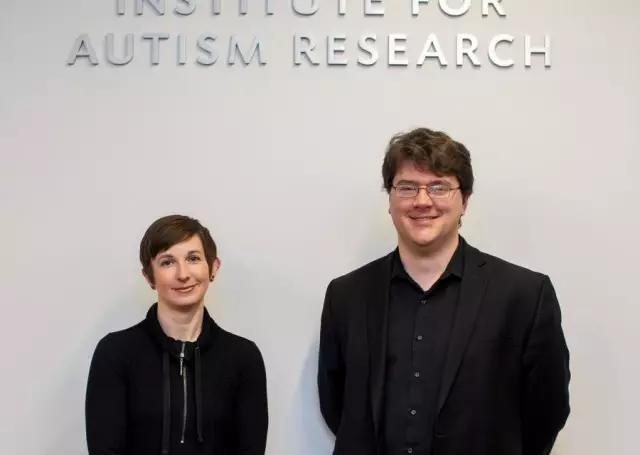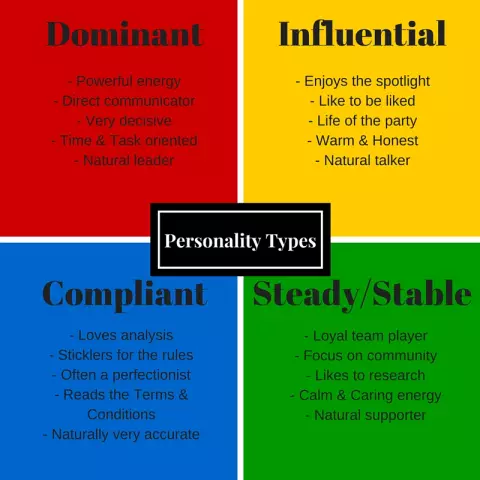- Author Rachel Wainwright wainwright@abchealthonline.com.
- Public 2023-12-15 07:39.
- Last modified 2025-11-02 20:14.
10 types of personality disorders and their external manifestations
About 10% of people suffer from personality disorders (otherwise - constitutional psychopathies). Pathologies of this kind are outwardly manifested by persistent behavioral disorders that adversely affect the life of the patient himself and his environment. Of course, not every person who behaves eccentric or unusual for others is a psychopath. Deviations in behavior and character are considered pathological if they can be traced back to adolescence, spread to several aspects of life and lead to personal and social problems.

Source: depositphotos.com
Paranoid disorder
A person with paranoid personality disorder trusts nothing or anyone. He painfully perceives any contacts, suspects everyone of ill will and hostile intentions, negatively interprets any actions of other people. We can say that he considers himself the object of a worldwide villainous conspiracy.
Such a patient is constantly unhappy or afraid of something. At the same time, he is aggressively disposed: he actively accuses others of exploiting, offending, deceiving, etc. Most of such accusations are not only baseless, but also directly contradict the real state of affairs. A person suffering from paranoid disorder is very vindictive: for years he can remember his real or perceived wrongs and settle scores with the "offenders".
Obsessive compulsive disorder
An obsessive-compulsive person is prone to absolute pedantry and perfectionism. Such a person does everything with exaggerated accuracy, strives to subordinate his life once and for all to established schemes. Any little thing, such as changing the arrangement of the dishes on the table, can infuriate him or cause hysteria.
The person suffering from obsessive-compulsive disorder considers his lifestyle to be absolutely correct and the only acceptable one, therefore he aggressively imposes such rules on others. At work, he interferes with colleagues with constant nagging, and in the family he often becomes a real tyrant, who does not forgive his loved ones even the slightest deviation from his ideal.
Asocial disorder
Asocial personality disorder is characterized by rejection of any rules of conduct. Such a person does not study well because of a lack of ability: he simply does not fulfill the teacher's assignments and does not attend classes, because this is a prerequisite for learning. For the same reason, he does not come to work on time and ignores the instructions of his superiors.
The behavior of the asocial type is not protest: a person violates all norms in a row, and not only those that seem to him to be incorrect. And he very quickly comes into conflict with the law, starting with petty hooliganism and damage or misappropriation of other people's property. Offenses usually have no real motivation: a person hits a passer-by for no reason and takes his wallet from him, not needing money. Those who suffer from antisocial disorder are not kept even in criminal communities - there, after all, there are also rules of conduct that the patient is unable to observe.
Schizoid disorder
The schizoid type of personality is characterized by a refusal to communicate. A person seems to others unfriendly, cold, detached. He usually does not have friends, does not contact with anyone, except for the closest relatives, he chooses work so that he can do it alone, without meeting people.
The schizoid shows little emotion, is equally indifferent to criticism and praise, and is practically not interested in sex. A person of this type is difficult to please with something: he is almost always indifferent or dissatisfied.
Schizotypal disorder
Like schizoids, people with schizotypal disorder avoid making friendships and family ties, preferring loneliness, but their initial message is different. Individuals with schizotypal disabilities are extravagant. They often share the most ridiculous superstitions, consider themselves psychics or magicians, can dress strangely and in detail, artistically express their views.
People with schizotypal disorder have a variety of almost unrelated fantasies, visual and auditory illusions. Patients imagine themselves as the protagonists of events that have nothing to do with them.
Hysteroid disorder
The person suffering from hysterical personality disorder feels that they are deprived of the attention of others. He is ready to do everything to be noticed. At the same time, the hysteroid does not see a significant difference between real achievements, worthy of recognition, and scandalous antics. Such a person perceives criticism painfully: if he is condemned, he falls into rage and despair.
Hysteroid personality is prone to theatricality, pretentious behavior, exaggerated demonstration of emotions. Such people are very dependent on other people's opinions, selfish and very condescending to their own shortcomings. Usually they seek to manipulate loved ones, blackmail and scandals to get them to fulfill any of their whims.
Narcissistic disorder
Narcissism manifests itself in the belief in unconditional superiority over other people. A person suffering from such a disorder is confident in his right to universal admiration and requires worship from everyone he comes across. He is incapable of understanding other people's interests, empathy and a critical attitude towards himself.
Persons prone to narcissism constantly brag about their achievements (even if in reality they do not do anything special), demonstrate themselves. The narcissist explains his any failure with envy of his success, the fact that others are unable to appreciate him.
Borderline disorder
This pathology manifests itself in extreme instability of the emotional state. A person instantly goes from joy to despair, from stubbornness to gullibility, from calmness to anxiety, and all this for no real reason. He often changes political and religious beliefs, constantly offends loved ones, as if deliberately pushing them away from himself, and at the same time is panicky afraid of being left without their support.
Borderline disorder means that a person will periodically become depressed. Such individuals are prone to repeated suicide attempts. Trying to be comforted, they often fall into drug or alcohol dependence.
Avoidant disorder
A person with avoidance disorder considers himself to be completely worthless, unattractive, and unfortunate. At the same time, he is very afraid that others will confirm this opinion, and as a result avoids any communication (except contacts with people who are guaranteed not to express a negative opinion), in fact, he hides from life: he does not meet anyone, tries not to take on new ones. doing things, fearing that nothing will work out.
Avoidant personality disorder can be thought of as an exaggerated form of shyness based on a severe inferiority complex.
Addicted disorder
A person with addictive personality disorder suffers from a completely unfounded confidence in their own helplessness. It seems to him that without advice and constant support from loved ones, he will not survive.
The patient completely subordinates his life to the requirements (real or imaginary) of those persons whose help he seems to need. In the most severe case, a person cannot be alone at all. He refuses to make independent decisions, demands advice and recommendations even on trifles. In a situation where he is forced to show independence, the patient panics and begins to follow any advice, regardless of what result they may lead to.
Psychologists believe that the origins of personality disorders lie in childhood and adolescent experiences, in the circumstances that accompanied a person for the first 18 years of his life. Over the years, the condition of such patients hardly changes. Personality disorders are not corrected with medication. These patients are treated using psychotherapeutic methods (family, group and individual sessions) and methods such as environmental therapy (living in special communities). However, the likelihood of improvement in the condition of most patients is low: 3 out of every 4 suffering from personality disorders do not consider themselves sick and refuse to receive diagnosis and help from specialists.
YouTube video related to the article:

Maria Kulkes Medical journalist About the author
Education: First Moscow State Medical University named after I. M. Sechenov, specialty "General Medicine".
Found a mistake in the text? Select it and press Ctrl + Enter.






